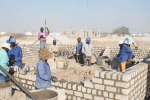Namibia is participating in the Southern African Development Community (SADC) Cluster Meeting of Ministers Responsible for Transport, ICT, Information and Meteorology, which started on 24 February up until 28 February 2025 in Harare, Zimbabwe. The meeting provides a platform for regional leaders to discuss key issues affecting infrastructure development, policy harmonisation, and the adoption of emerging technologies to drive economic growth.
Representing Namibia at the meeting are officials from the Namibian Embassy in Zimbabwe, Ministry of Information and Communication Technology (MICT), the Ministry of Works and Transport (MWT), and the Communication Regulatory Authority of Namibia (CRAN). The delegation includes:
- H.E. Mr Kandjii Nicklaas R, Ambassador of the Republic of Namibia to Zimbabwe
- Mr. Jonas Sheelongo – Deputy Executive Director: Transport (MWT)
- Ms. Linda N. Nakale – Director for ICT Development (MICT)
- Mr. Israel Haindongo – Deputy Director: Meteorological Services (MWT)
- Ms. Grace N. Nambundunga – Cabinet Liaison Officer (MWT)
- Ms. Ronel le Grange – Executive: Engineering & Technical Services (CRAN)
- Ms. Helene Vosloo – Executive: Economics and Market Development (CRAN)
- Mr. Mufaro Nesongano – Executive: Communication & Consumer Relations (CRAN)
- Ms. Lovisa Shilongo – Manager: Business & Transformation (CRAN)
This meeting is a crucial opportunity for Namibia to collaborate with SADC counterparts on strengthening regional integration on transport infrastructure development, digital connectivity, and enhancing climate resilience through coordinated meteorological services.
Southern Africa continues to advance infrastructure development in transport, ICT, and meteorology, sectors that are vital to economic growth, trade, and regional integration. However, despite notable progress, challenges remain; requiring increased collaboration, investment, and policy harmonisation.
The Southern African Development Community and the African Union’s Programme for Infrastructure Development in Africa (PIDA) have implemented various initiatives aimed at improving transport infrastructure, energy networks, and digital transformation. The SADC Protocol on Transport, Communications, and Meteorology provides a framework for regional cooperation, supporting policy harmonisation and cross-border infrastructure development.
Transport infrastructure remains crucial for mobility, connectivity, trade, and tourism in Southern Africa. Major projects such as the Kazungula Bridge and the anticipated Trans-Zambezi Railway Project, the Trans-Kalahari Railway Projects, complementing the North-South Corridor, will immensely improve regional connectivity. Additionally, smart transport solutions, including digital logistics platforms and intelligent transport systems, are being explored to optimise freight and passenger movement.
However, challenges such as funding constraints and policy misalignment persist. Addressing these requires sustainable financing mechanisms, stronger public-private partnerships (PPPs), and the integration of emerging technologies to enhance efficiency.
ICT is revolutionising Southern Africa’s economy, with increased mobile penetration, expanded internet connectivity, and the rise of digital financial services fostering growth in e-commerce, e-government, and innovation. However, rural areas continue to face digital divides due to limited broadband access and high data costs.
The SADC Digital Economy Strategy aims to address these gaps by promoting digital inclusion, cybersecurity frameworks, and investment in fibre-optic networks. Additionally, emerging technologies such as 5G and Artificial Intelligence (AI) hold significant potential to transform key industries such as agriculture, health, and education.
To support regional digital transformation, SADC has launched several initiatives, including:
- The SADC Model National Emergency Telecommunications Plan (NETP)
- The SADC Shared Satellite System
- The SADC Regional Computer Incident Response Team (CIRT)
- The SADC Harmonised Cybersecurity Framework
- These efforts highlight the region’s commitment to continuous technological advancement and digital security.
Strengthening Meteorological Services for Climate Resilience
With climate change leading to increased droughts, cyclones, and floods, strengthening meteorological services is crucial for disaster preparedness and climate resilience. Recent extreme weather events, such as the heavy rains in Botswana that resulted in fatalities, underscore the urgency of improved forecasting and early warning systems.
The SADC Climate Services Centre and the Regional Meteorology Strategy are working to enhance meteorological infrastructure, build technical capacity, and foster cross-border collaboration to improve climate adaptation measures.
Fostering Regional Integration and Economic Growth
The African Continental Free Trade Area (AfCFTA) presents new opportunities for intra-African trade, industrialisation, and investment. However, challenges such as non-tariff barriers, inadequate infrastructure, and policy misalignment remain obstacles to full regional integration.
To accelerate economic growth, SADC encourages the prioritization of the following:
- Harmonising transport policies
- Reducing transportation costs
- Enhancing seamless mobility across member states
- Strengthening partnerships in energy-sharing,
- Joint infrastructure projects development, and
- digital transformation
As Southern Africa continues to advance its infrastructure agenda, regional cooperation, policy alignment, and investment in emerging technologies will be key to driving sustainable economic growth.
The ongoing SADC Cluster Meeting of Ministers Responsible for Transport, ICT, Information and Meteorology serves as a platform for member states to deliberate on challenges, assess progress, and reaffirm their commitment to infrastructure development.
SADC remains committed to fostering economic prosperity through strategic investments in transport, ICT, and meteorological services, ensuring a more interconnected and resilient future for the region.
“As Namibia engages in these critical discussions, it remains essential to ensure that the insights gained, and initiatives adopted are effectively integrated into national frameworks. Accordingly, the outcomes of this meeting will be aligned with the National Development Plans (NDP 6), Integrated Strategic Business Plans and Annual Business & Financial Plans of the respective implementation agencies. This approach will ensure that regional commitments are translated into actionable strategies within the relevant institutions, supporting Namibia’s socio-economic development and regulatory objectives”, stated Mr. Jonas Sheelongo, Deputy Executive Director: Transport in the Ministry of Works and Transport.










